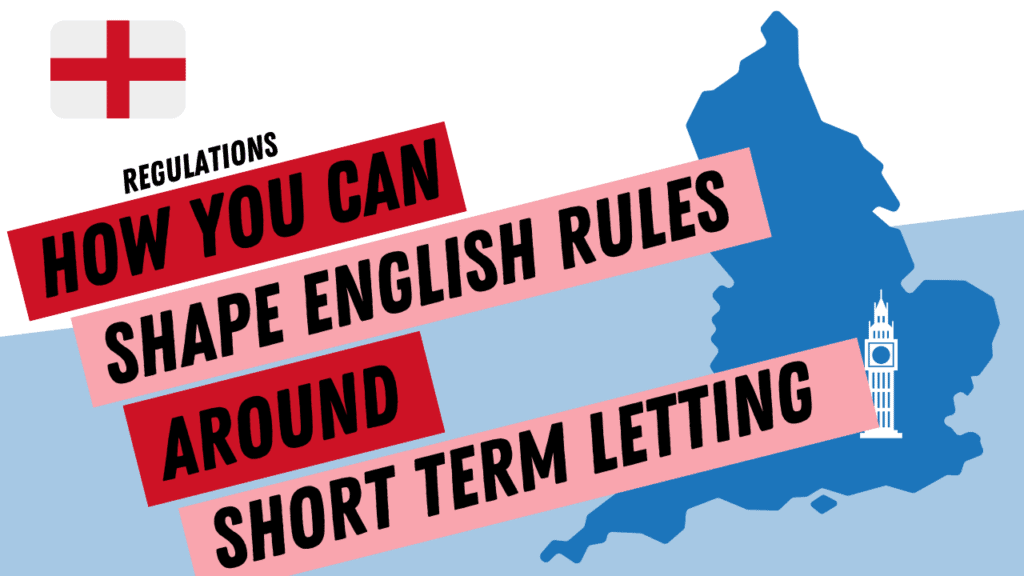In its 2021 Tourism Recovery Plan, the English government set out its intention to consider a Tourist Accommodation Registration Scheme. To understand the market and pick the best policies, The Department for Digital, Culture, Media and Sport (DMCS) launched, on 29 June 2022, an open consultation around “developing a tourist accommodation registration scheme in England”. Unlike Scotland and Northern Ireland, England has no national policy and is looking to decide on it. Individual hosts, short-term and holiday let service companies, and other stakeholders can respond to this call for evidence by filling in this online questionnaire before 21 September 2022. At Rental Scale-Up, we think that this open consultation is one of the best documents put together by any local authorities. It draws a compelling portrait of the benefits and challenges in any short-term rental market, not just in England. It also does a fair job explaining why the government needs to collect more data and opinions before picking a policy. By the way, the government also wants stakeholders to share which consequences each recommended policy could have.
Why the need for an open consultation around a tourist accommodation registration scheme in England?
What is a short-term letting?
Here’s the definition that the English authorities are using in their document:
The term ‘short-term letting’ is most commonly used to refer to the offering of residential accommodation to one or more paying guests. It can include single rooms within a shared premises or the letting of an entire premises. The premises could be anything from a house or flat to a caravan or houseboat. Guests could travel with tourism in mind (“holiday or vacation letting”), or for other purposes such as work or to stay somewhere whilst their house is being refurbished.
An unregulated market that or many need new policies
In England, the short-term and holiday letting sector is currently unregulated, except in London where there is a cap of 90 days per year for letting out a property on a short-term basis, introduced via an amendment to the Greater London Council (General Powers) Act 1973 under the Deregulation Act 2015.
The document then makes a pretty good summary of the recent evolutions and tensions that are present in every short-term rental market in the world:
The shape of England’s guest accommodation landscape has changed over the last fifteen years. Most notably, the rise of digital platforms such as Airbnb and Booking.com have led to significant growth in the range and volume of guest accommodation on the market, particularly short-term and holiday lets. These platforms have brought many benefits, including new routes to market for many forms of accommodation business, expanded consumer choice and access to new income streams for homeowners. We recognise however that some have raised concerns about compliance with existing regulations and the impact on local communities.
The expansion of the short-term and holiday letting market has also prompted other innovations. For example, there are now a multitude of companies offering home management services to hosts (e.g. cleaning services between lets), other hosting services (e.g. vetting guests and developing letting adverts), support services (e.g insurance), tech-based solutions (e.g. to determine optimal pricing) and a wider range of quality assessments.
The lack of reliable market data for England also prompts authorities to reach out to potential sources
The people behind this open consultation state that there is no single, definitive source of data on short-term and holiday letting activity in England. Here’s how they explain the lack of data for the English short-term rental market:
This is driven in part by definitional difficulties (e.g. when does a let cease to be short term?) but also because, unlike in some other countries, there are no obligations on operators in England to report information on staying guests to local or national authorities. In England, we tend to rely on either surveys, data published by private companies or data collated by third party providers such as AirDNA.

Which are policies that are being discussed for the English short-term rental market?
Here’s a broad framework of the short-term and holiday letting policies that England is contemplating:
- Do nothing
- Provide more information to the sector
- Develop a self-certification registration scheme
- Develop a registration scheme with light-touch checks
- Develop a licencing scheme with physical checks of the premises
- Regulatory alternative to a registration system, such as extension of the Deregulation Act 2015 (Currently, this framework only applies to Greater London)
Tourist accommodation registration scheme in England: What the government wants to talk about
This call for evidence seeks insight and information in the following areas:
- changes and growth in the short-term letting market
- benefits of short term lets
- challenges, including compliance with the existing regulatory framework and housing and community impacts
- the impact of potential policy responses
- Together, questions in each of these areas are designed to ensure firstly that the government develops a fuller understanding of the current market, and secondly that future policy responses are proportionate and evidence-based.
Hosts and property management companies are invited to answer a series of questions that can help the English authorities
English market data
The government wants to get help gathering evidence illustrating the size and nature of the short-term and holiday letting market in England and/or its regions, and how that has changed over time. For instance, they are looking for:
- data illustrating the picture at a national level
- data illustrating the picture in different regions of England
- data that might help with equalities analysis (sex, ethnicity, sexual orientation and other protected characteristics listed in the Equality Act 2010), e.g. proportion of hosts on a platform that are male/female
- data illustrating changes since 2010, including during the pandemic
Benefits of short term and holiday lets
The Department for Digital, Culture, Media and Sport (DMCS) seeks evidence on the benefits arising from the increase in short-term and holiday letting in England. The government is keen to understand more about the benefits of short-term and holiday letting and the increasing prevalence of such activity driven by the emergence of online platforms, such as:
- Benefits to homeowners
- property owners are able to take the opportunity to utilise an otherwise dormant or underused asset (either a room or an entire property) to earn additional income
- opportunity to connect with visitors from around the world and in some cases help combat loneliness
- Benefits to consumers
- broader choice on a variety of accommodation factors including price, location, convenience, type and range of experience
- more sustainable and environmentally friendly form of guest accommodation
- safer’ form of accommodation than options such as hotels and hostels, due to fewer opportunities for interaction with other
- meet consumer demand at times of high pressure on capacity
- Wider economic benefits
- benefits to businesses (platforms acting as a marketplace for short-term letting, ‘traditional’ accommodation providers using the platforms as an alternative route to market, or ‘supply’ businesses set up to support the operation of the short-term letting market — such as those offering bespoke insurance solutions, or cleaning services.
- Benefits stemming from the visitor dispersal enabled by the offer of accommodation outside of traditional tourist areas
Short term and holiday lets: challenges
Unsurprisingly, the government also wants to hear about the drawbacks of allowing short-term lets and holiday lets. Local councils in England have been flooded by requests to regulate or even ban short-term rentals and “airbnbs” because of various sources of nuisance caused to residents, from noise to trash.
Here are the areas that the open consultation wants to hear about:
- Compliance with existing regulatory framework
- Health and safety
- Fire Safety
- Gas Safety
- Health and Safety Regulations
- Compliance with contractual agreements (e.g. mortgages)
- Health and safety
- Housing and communities impact
- Impact on the housing market
- Effect on housing supply:
- Effect on price
- Effect on labour supply
- Noise, anti-social and other nuisance behaviour by guests
- Noise
- Waste
- Anti-social use of vehicles
- Drunken behaviour
- Drug taking
- Impact on the housing market
- Impact on local communities and residents
Impact of potential policy responses
The open consultation also wants stakeholders to discuss the impact of various policies. You will below a implied list of the policies that the government is contemplating:
- Do nothing
- Provide more information to the sector
- Develop a self-certification registration scheme
- Develop a registration scheme with light-touch checks
- Develop a licencing scheme with physical checks of the premises
- Regulatory alternative to a registration system, such as extension of the Deregulation Act 2015 (Currently, this framework only applies to Greater London)
Will local councils impose further restrictions on short term holiday lets?
Even before the conclusion of this open consultation, some people are finding that the government is not going far enough to regulate short-term lets. For instance, York Central MP Rachael Maskell said:
“I urge the Government to go further and introduce a licensing scheme to empower local councils to authorise or remove the right of landlords to let their homes, issue fines where there is anti-social behaviour, and to introduce a ban on new short term holiday lets in specified areas without special permission,” she said.
Here’s the link to know more about England’s open consultation on the topic of short-term lets. It looks like, in England, a Tourist Accommodation Registration Scheme. If you are a holiday let owner or short term let operator, our advice is that you let your voice heard. It is not a guarantee that regulations will go your way, but you may help shape the outcome of the consultation more than by ignoring it.








